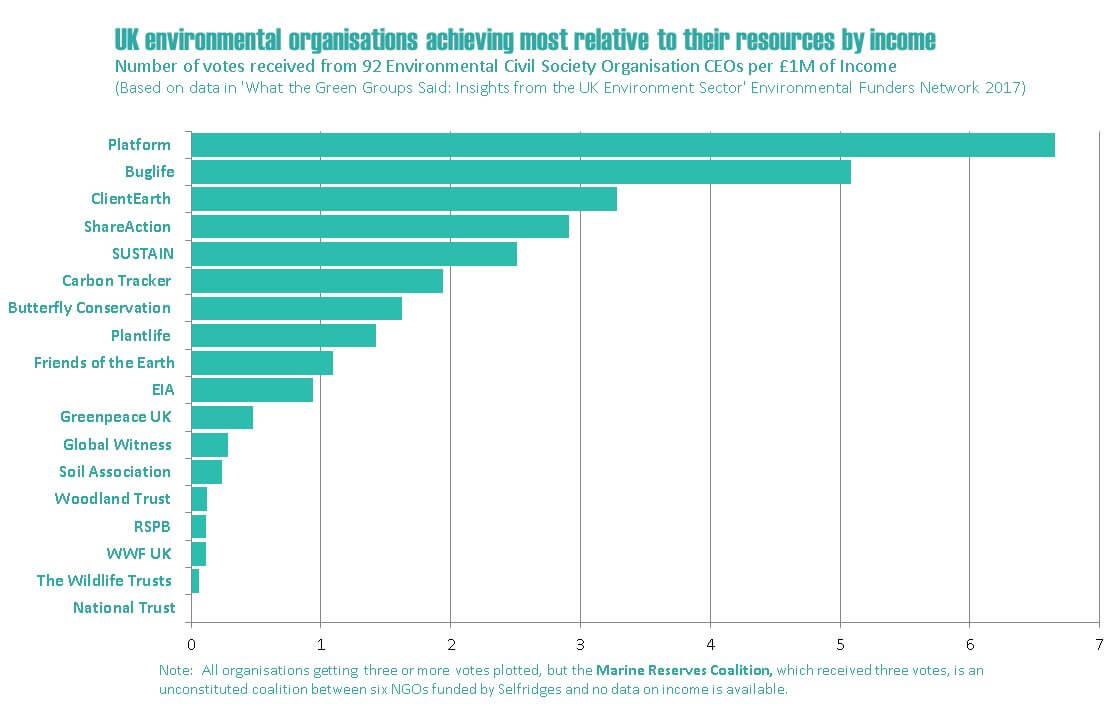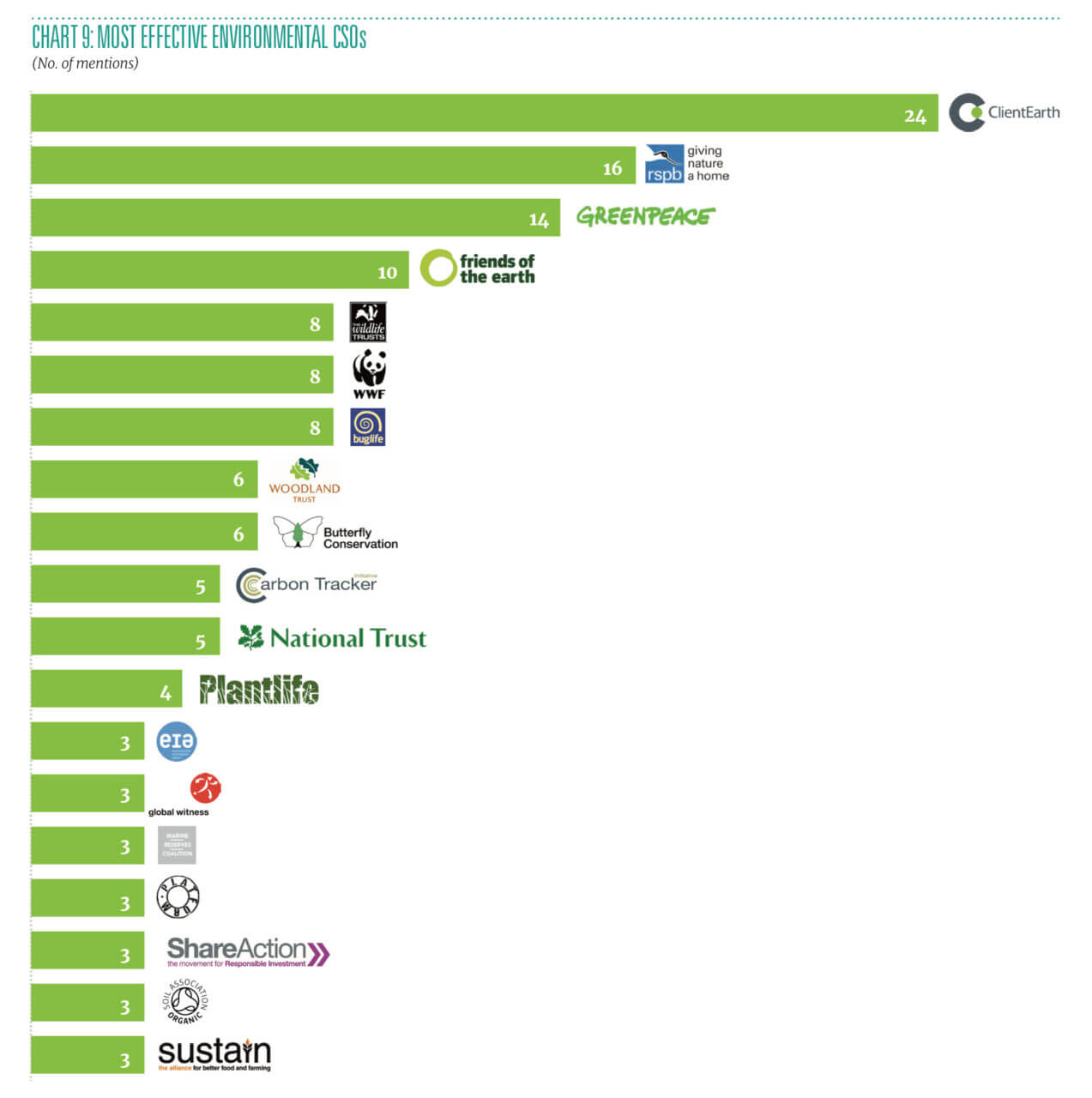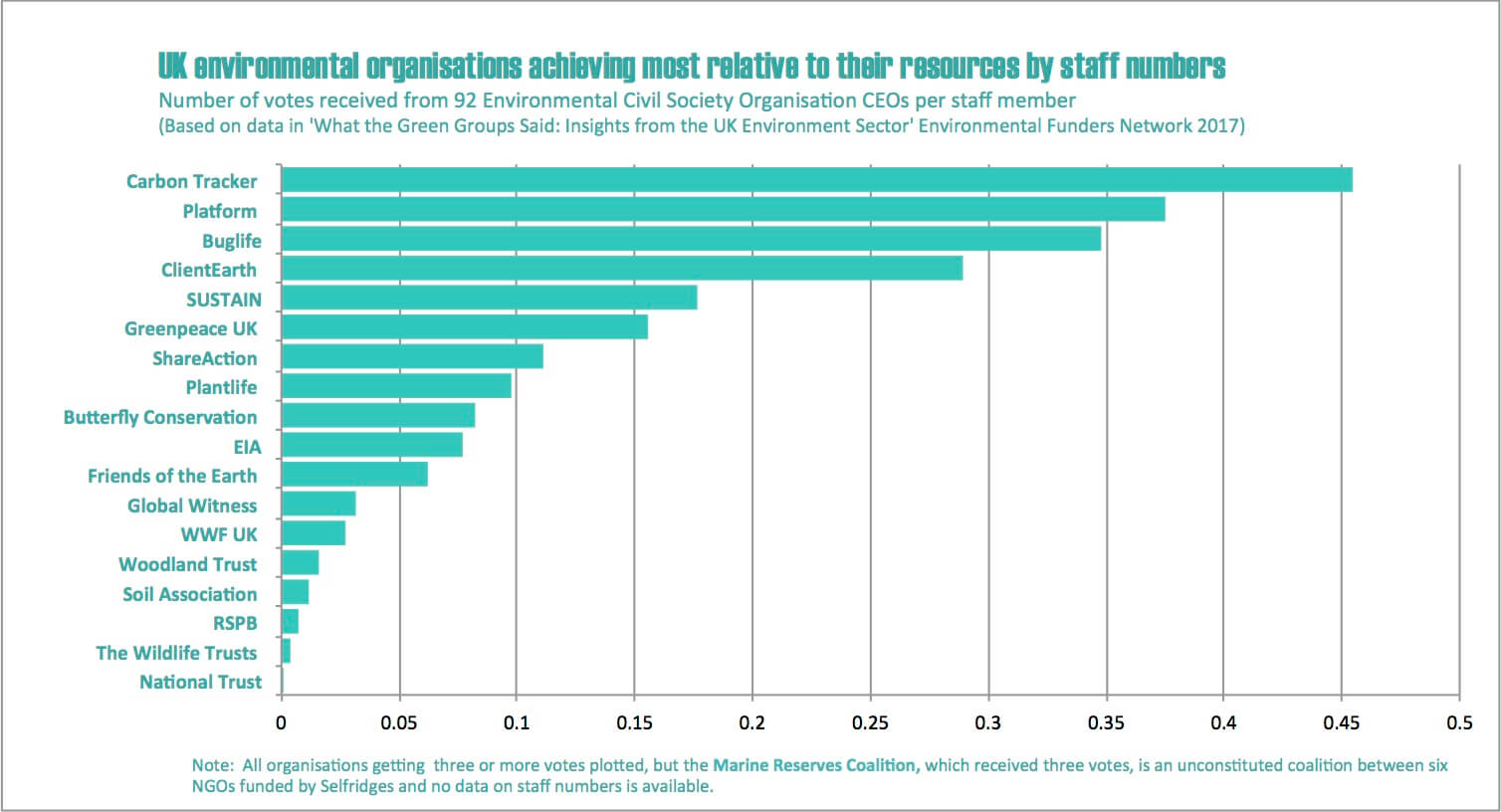A few weeks back, Matt Shardlow, CEO of Buglife, tweeted the chart underneath. It shows Platform apparently outstripping other UK environmental organisations in terms of our impact relative to our income. We were startled by this, and looked into the criteria and source.
The data was collected for the Environmental Funders Network’s interesting 2017 report ‘What the Green Groups Said. Insights from the UK Environment Sector’. Ninety-two CEOs of UK environmental organisations responded to a survey about effectiveness in the sector. It’s important to consider that these are CEOs, suggesting not grassroots organisations. The organisations that responded range from the National Trust, Carbon Tracker, Fresh Habitats Trust, Corporate Watch, Soil Association to Greenpeace. It’s also important think about those who didn’t (see p.28 for list of respondents and p.30 for the organisations surveyed in the report).
We contacted Matt to ask how the calculation in the above chart was made. He responded “The calculations were based on the number of votes in the Environmental Funders group (92) divided by income in the most recently reported full year – derived from their websites or Charity Commission records”. Platform got only 3 votes on effectiveness out of a total of 92, but this low number still put us joint 9th in the total list.
Here’s the report’s chart below for the 92 CEO’s views on the overall most effective environmental civil society organisation, where Platform comes joint 9th.
I’ll try to unpick this. Firstly the report is limited by the number of votes/number of organisations/type of organisations who responded. This cannot claim to be representative of the whole UK sector in any way at all, but it is a measure in its own terms. We should therefore approach the statistics and methodology quite cautiously due to the low numbers, and the kinds of organisations.
Despite some wariness about the sample and methodology, it is interesting to consider the finances here. The turnovers of the top four above range from a whopper £137,400,000 (RSPB) to £7,311,514 (Client Earth). Platform’s turnover in 2015/16 was £450,250, and the next lowest turnover in joint 9th place is ShareAction at £1,031,043. The highest is the Soil Association with £12,576,698. The calculation in the first chart therefore represents the impact that we have relative to our far lower income.
As stated, the data is influenced by who exactly responds, how many respond, who does not. The group of environmental organisations that did respond, or many those that were surveyed, aren’t necessarily those who we would see as natural close allies, although we were happy to see the hard work of UK Tar Sands Network, People and Planet, London Mining Network, Global Justice Now, and BP or Not BP, among other allies voted for their effectiveness. There are also many more grassroots groups whose work is not visible by respondents to this survey, from Wretched of the Earth to Reclaim the Power.
This list also in effect promotes a white-dominated environmental sector. For example, the report features a 13-person list of “environmental heroes” – best public advocates for environmental issues as named by the respondents – and it is entirely white. This huge issue is not mentioned by the report. Time for some more caution with the data.
Matt also kindly shared a second chart with us, the one below, where this time the data was calculated by staff numbers.
Both Platform and Buglife still ‘do well’. Platform has 11 staff, all part-time. Buglife’s website shows 29 staff, and Carbon Tracker 25 staff (of whom we can assume some are part-time). The ‘top performer’ Carbon Tracker’s turnover in 2015/16 was £2,576,580, roughly five times Platform’s, and roughly a million more than Buglife’s. Where does this leave us?
Even with some misgivings over the data, what is useful to us is that it gives a measure of visibility over our effectiveness compared to our income.
So, yes, Platform is lean and mean, even cut-price, but you know what,
there’s so much more we could do.
We want to do more, and we want to do it better. We want to share what we have, learn more, spread resources and skills. We want to do better to ensure that marginalised voices are amplified at the centre of UK environmental movements. We want to carry on challenging power and revealing new futures.
And we are constantly seeking greater financial backing at our core to ensure our time is spent as effectively as possible making these changes happen.
So, a big thank you to those who voted for us. But also a very big hello to those of you who would like to help us do this work better, bigger, and more sustainably.
One commenter on Facebook wrote this when she saw the chart: “What great work, and consistently over so many years”. Join us by helping us do it better as we enter our 35th year.
You can donate here as a one-off or join our group of Sustainers, or, email [email protected] if you want to get in touch.
And the other very useful thing about the report is it encourages us to ask:
how do we measure effectiveness?
Who should get to define whether an organisation or movement is effective? Who’s framing the question, in whose interests?
What criteria and methodology would you use?
Thank you to Matt Shardlow and EFN.


